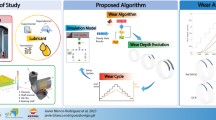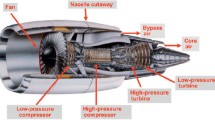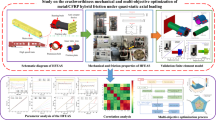Abstract
The estimation of the lifetime of thermo-mechanically loaded components by testing is very costly and time-consuming, since the high temperature cycle time in practical application dominates the test duration. Common frequencies for TMF (thermo-mechanical fatigue) tests are at about 0.01 Hz compared to 10–100 Hz at HCF (high cycle fatigue) and about 0.1–1 Hz at isothermal LCF (low cycle fatigue) tests. Therefore, the simulation of fatigue life is an important design step in the fast moving and competitive automotive industry, where the steady rise of engine power and the demand for lightweight construction concurrent with enhanced reliability require an optimised dimensioning process. Methods and models are usually derived from results made on tests with specimens, since it is possible to systematically and exactly define loading parameters and measurement categories. After an extensive test programme (tensile tests, creep tests, low cycle fatigue tests and thermo-mechanical fatigue tests with different influences on specimens) it was possible to develop material models for the simulation of the time- and temperature dependent stress–strain hystereses and damage models for the simulation of the TMF lifetime. Based on this knowledge the whole simulation chain to determine the TMF life of a component is introduced: thermal calculation, mechanical calculation and lifetime calculation. Furthermore the transferability of specimen based simulation models to real components (an alternative test piece and a cylinder head) is investigated.
Similar content being viewed by others
References
Ayadi Z, Martin B, Leclercq S, Nivoit M, Cunat Ch: (2004) Modelling of cyclic mechanical behaviour of 316SPH steel by a non-linear relaxations approach. Meccanica 39(1):81–85
Bakis CE, Castelli MG, Ellis JR: (1993) Thermo-mechanical testing in torsion: test control and deformation behavior. In: McDowell DL, Ellis JR (eds) Multiaxial fatigue behavior, STP1191. American society for testing and materials, Philadelphia
Basquin OH: The exponential law of endurance tests. In: Proceedings of the ASTM 10, pp 625–630
Charkaluk E, Constantinescu A: (2000) An energetic approach in thermo-mechanical fatigue for silicon molybdenum cast iron. Materials high temp 17(3):373–380
Chieragatti R, Paun F: (2000) A new technique for high frequency multiaxial thermo-mechanical fatigue testing of materials. In: Sehitoglu H, Maier HJ (eds) Thermo-mechanical fatigue behaviour of materials: third volume, STP 1371, American society for testing and materials, West Conshohocken, pp 319–332
Coffin LF: (1953) A study of the effects of cyclic thermal stresses on a ductile metal. Trans. ASME A 76:931–950
FEMFAT (2005) Finite Elemente Methode und Betriebsfestigkeit—Theorie Grundmodul, Manual zur Software FEMFAT, ECS Steyr, St. Valentin
Golos KM: (1995) Thermo-mechanical fatigue life prediction in terms of energy. In: Bressers J, Rémy L, Steen M, Vallés JL (eds) Fatigue under thermal and mechanical loading: mechanisms, mechanics and modelling. Kluwer Academic Publishers, Petten, pp 467–473
Ieşan D, Nappa L: (2004) Thermal stresses in plane strain of porous elastic solids. Meccanica 39(2):125–138
Langmayr F, Zieher F: (2004) Thermomechanik in Zylinderköpfen. In: Ventiltrieb und Zylinderkopf, VDI-Berichte 1813, VDI Verlag GmbH, Düsseldorf, pp 227–243
Lemaitre J, Chaboche JL: (1990) Mechanics of solid materials. Cambridge University Press, Cambridge
Loehe D, Beck T, Lang K-H: (2004) Important aspects of cyclic deformation, damage and lifetime behaviour in thermo-mechanical fatigue of engineering alloys. In: Portella PD, Sehitoglu H, Hatanaka K (eds) Fifth international conference on low cycle fatigue, LCF5. DVM, Berlin, pp 161–175
Manson SS: (1954) Behaviour of materials under conditions of thermal stress. NACA Report 1170
McCarthy P: (2000) The practicalities of thermo-mechanical fatigue testing in the new millennium, proceedings of the HTMTC seminar, Darmstadt
Miller MP, McDowell DL, Oehmke RLT, Antolovich SD: (1993) A life prediction model for thermo- mechanical fatigue based on microcrack propagation. In: Sehitoglu H (ed) Thermo-mechanical fatigue behaviour of materials, STP 1186. American society for testing and materials, Philadelphia, pp 35–49
Minichmayr R, Riedler M, Eichlseder W: (2005) Thermomechanische Ermüdung von Aluminiumlegierungen—Versuchstechnik und Methoden der Lebensdaueranalyse. Materialpruefung 47(10):591–600
Minichmayr R, Riedler M, Eichlseder W: (2005) Evaluation of creep behaviour and fatigue life under TMF-loading for alloy AlCuBiPb. In: Carpinteri A (ed) 11th International conference on fracture, ICF11. Turin
Minichmayr R, Riedler M, Winter G, Leitner H, Eichlseder W: Thermo-mechanical fatigue life assessment of aluminium components using the damage rate model of Sehitoglu, Int. J. of Fatigue (accepted)
Minichmayr R: (2005) Modellierung und simulation des thermomechanischen ermüdungsverhaltens von aluminiumbauteilen. PhD Thesis, University of Leoben
Molina R, Leghissa M, Mastrogiacomo L: (2004) High performance cylinder heads—case studies: application of LHIP and split cylinder head concept. In: Ventiltrieb und Zylinderkopf, VDI-Berichte 1813, VDI Verlag GmbH, Düsseldorf, pp 217–226
Neu RW, Sehitoglu H: (1989) Thermo-mechanical fatigue, oxidation and creep, part II: life prediction. Met trans A, 20:1769–1783
Ostergren WJ: (1976) A damage function and associated failure equations for predicting hold time and frequency effects in elevated temperature low cycle fatigue. J Test Eval 4:327–339
Ramberg W, Osgood WR: (1943) Description of stress–strain curves by three parameters. NACA Technical Note 902
Riedler M, Eichlseder W: (2004) Effects of dwell times on thermo-mechanical fatigue. Mat test 46(11–12): 577–581
Riedler M, Eichlseder W, Minichmayr R: (2004) Relationship between LCF and TMF: Similiarities and varities. In: Pappalettere C (ed) 12th International conference on experimental mechanics, ICEM12, McGraw-Hill, Bari, Paper no. 102
Riedler M, Eichlseder W: (2004) Temperature control method in elevated and fluctuating temperature fatigue tests. Mat. eng. 11(3):1–7
Riedler M, Minichmayr R, Eichlseder W: (2005) Methods for the thermo-mechanical fatigue simulation based on energy criterions. In: 6th international conference of assessment of reliability of materials and structures: problems and solutions, RELMAS2005, St. Petersburg, pp 496–503
Riedler M: (2005) TMF von Aluminiumlegierungen—Methodikfindung zur Simulation von thermomechanisch beanspruchten Motorbauteilen aus AluminiumlegierUngen, Fortschritt-Berichte VDI, 718
Riedler M, Winter G, Minichmayr R, Eichlseder W: (2005) The use of classical damage parameters for a thermo-mechanical lifetime assessment. In: Nicoletto G (ed) 22nd Danubia-Adria symposium on experimental methods in solid mechanics, DAS22, Parma, pp 194–195
Riedler M, Winter G, Minichmayr R, Eichlseder W: (2005) Applicability of plastic and total hysteresis energy criterions for simulating the TMF lifetime. In: Haehner P (ed) High temperature thermo-mechanical fatigue: testing methodology, interpretation of data and applications, Growth Project TMF Standard, Berlin
Riedler M, Minichmayr R, Eichlseder W: (2005) The influences of pre-aging, temperature, mean and local strain on low cycle fatigue and thermo-mechanical fatigue. In: Carpinteri A (ed) 11th International conference on fracture, ICF11, Turin
Saltsman JF, Halford GR: (1998) Life prediction of thermo-mechanical fatigue using total strain version of strain range partitioning (SRP) – a proposal. NASA TP, 2779
Sehitoglu H, Qing X, Smith T, Maier HJ, Allison JA: (2000) Stress–strain response of a cast 319-T6 aluminium under thermo-mechanical loading. Metall mater trans A, 31A:139–151
Shercliff HR, Ashby MF: (1990) Process model for age hardening of aluminium alloys - I. The model. Acta metall mater 38(10):1789–1802
Simon C, Santacreu PO: (2002) Life time prediction of exhaust manifolds. In: Biallas G, Maier HJ, Hahn O, Herrmann K, Vollertsen F (eds) Proceedings CAMP2002—high-temperature fatigue. Bonifatius GmbH Druck, Paderborn, pp 257–267
Skelton RP: (2004) Hysteresis, yield, and energy dissipation during thermo-mechanical fatigue of a ferritic steel. Int J Fatigue 26:253–264
Smith KN, Watson P, Topper TH: (1970) A stress–strain function for the fatigue of metals. J Mat 5(4):767–778
Song G, Hyun J, Ha J: (2001) Creep-fatigue life prediction of 13CrMo44 steels by using the plastic strain energy. In: Proceedings of temperature fatigue interaction, SF2M, pp 47–54
Thomas JJ, Verger L, Bignonnet A, Charkaluk E: (2004) Thermo-mechanical design in automotive industry. Fat and fract of eng mat and struct 27:887–895
Tomkins B, Sumner G, Wareing J: (1979) Factors affecting crack propagation in low-cycle fatigue. In: Rie K-T, Haibach E (eds) International symposium on low cycle fatigue strength and elasto-plastic behaviour in materials. DVM, Berlin, pp 495–508
Trampert S, Maassen F: (2004) Zylinderköpfe für hohe Spitzendrücke und Literleistungen. In: Ventiltrieb und Zylinderkopf, VDI-Berichte 1813. VDI Verlag GmbH, Düsseldorf, S. 203–216
Zamrik SY, Renauld ML: (2000) Thermo-mechanical out-of-phase fatigue life of overlay coated IN-738LC gas turbine. In: Sehitoglu H, Maier HJ (eds) Thermo-mechanical fatigue behaviour of materials: Third volume, STP 1371, American society for testing and materials, West Conshohocken, pp 119–137
Author information
Authors and Affiliations
Corresponding author
Rights and permissions
About this article
Cite this article
Riedler, M., Leitner, H., Prillhofer, B. et al. Lifetime simulation of thermo-mechanically loaded components. Meccanica 42, 47–59 (2007). https://doi.org/10.1007/s11012-006-9020-z
Received:
Accepted:
Published:
Issue Date:
DOI: https://doi.org/10.1007/s11012-006-9020-z




